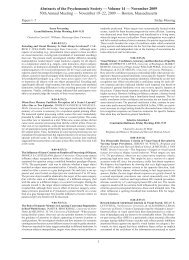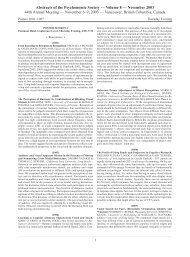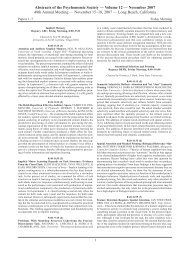Abstracts 2005 - The Psychonomic Society
Abstracts 2005 - The Psychonomic Society
Abstracts 2005 - The Psychonomic Society
Create successful ePaper yourself
Turn your PDF publications into a flip-book with our unique Google optimized e-Paper software.
Friday Noon Posters 2035–2041<br />
(2035)<br />
Why Does Feedback Improve Recognition Memory for Unfamiliar<br />
Melodies, but Not for Words? JUSTIN KANTNER & D. STEPHEN<br />
LINDSAY, University of Victoria—<strong>The</strong> question of whether trial-bytrial<br />
feedback at test (without test item repetition or repeated study–test<br />
cycles) can improve recognition memory bears on both theoretical accounts<br />
of recognition and the development of rehabilitation programs<br />
for individuals with memory impairments. Yet the effect of feedback<br />
on recognition memory has received little empirical attention. A series<br />
of experiments in our lab using words as stimuli failed to show<br />
any effect of feedback on recognition accuracy or confidence, a result<br />
consistent with theories characterizing recognition as strictly familiarity<br />
based but inconsistent with those suggesting that inferential<br />
processes inform recognition memory judgments. In two experiments<br />
using highly complex and structured but unfamiliar materials (short<br />
clips of traditional Korean music), however, feedback did improve<br />
recognition accuracy: Subjects receiving feedback showed significantly<br />
lower false alarm rates than did controls. Potential explanations<br />
for this pattern of findings, as well as implications for single- versus<br />
dual-process theories of recognition, are considered.<br />
(2036)<br />
Improving Memory for Information From Text: Benefits of Retrieval<br />
Practice With and Without Re-Presentations. CATHERINE<br />
O. FRITZ, PETER E. MORRIS, PETER J. HAMPSON, & CAROLINE<br />
WADE, Lancaster University—Retrieval practice can be effective in<br />
improving memory for information from expository texts. We briefly<br />
summarize recent research and present new data. Participants read a<br />
short expository text and then practiced answering questions of fact<br />
based on the text. Retrieval practice improved memory for the information,<br />
as measured by criterion tests shortly after the practice session<br />
and 1 week later. For some participants, practice tests were accompanied<br />
by immediate re-presentation of the correct information.<br />
<strong>The</strong> inclusion of re-presentations did not lead to a lazy response style<br />
(i.e., being less likely to produce the answers) during practice. With<br />
re-presentations, performance improved with each practice event. Following<br />
practice with re-presentations, performance was better on the<br />
initial criterion test and remained better across the delay. Although representations<br />
led to better recall, there was little evidence that they retarded<br />
loss over the intervening week.<br />
(2037)<br />
Self-Generated Versus Experimenter-Supplied Mediators in Learning<br />
and Remembering Indonesian–English Word Pairs. ROBERT J.<br />
CRUTCHER, University of Dayton—An important issue in memory<br />
research is the effectiveness of self-generated versus experimentersupplied<br />
mediators in remembering unfamiliar material. In the present<br />
study, subjects learned Indonesian–English word pairs (e.g.,<br />
bulan–moon) using the keyword method (e.g., the keyword bullet<br />
sounds like bulan and can be used to imagine a bullet shot through the<br />
moon). For half of the pairs, subjects studied the Indonesian word and<br />
its English translation using supplied keywords (e.g., bulan–bullet–<br />
moon). For the other half of the pairs, subjects saw only the Indonesian<br />
and English word pair (e.g., bulan–moon) and had to generate<br />
their own keyword mediator while learning the pair. Subjects were<br />
tested on the word pairs within a cued recall paradigm. Results showed<br />
significantly higher recall of the Indonesian–English pairs learned<br />
with self-generated keyword mediators than of the pairs learned with<br />
experimenter-supplied mediators.<br />
(2038)<br />
Item and Relational Information <strong>The</strong>ory: Applied Evidence From<br />
Commercial Sponsorship. CLINTON S. WEEKS, MICHAEL S.<br />
HUMPHREYS, & T. BETTINA CORNWELL, University of Queensland<br />
(sponsored by Michael S. Humphreys)—Einstein and Hunt’s<br />
(1980; Hunt & Einstein, 1981) item and relational information propositions<br />
regarding semantic relatedness and orientation toward encoding<br />
were examined in the applied setting of commercial sponsorship.<br />
75<br />
<strong>The</strong>oretically, congruent sponsor–sponsee pairings (e.g., sportswear<br />
brands sponsoring sporting events) should be encoded automatically<br />
as relational information, whereas incongruent pairings (e.g., telecommunications<br />
brands sponsoring sporting events) should be encoded<br />
automatically as item information. Improved memory should result<br />
from orienting individuals toward encoding the alternative form of information.<br />
Using a 2 � 3 within-subjects experimental design, participants<br />
listened to 12 (congruent and incongruent) sponsorship press<br />
announcements, each of which incorporated either relational (sponsor–<br />
sponsee linking), item (sponsor-specific and sponsee-specific), or<br />
filler information about a sponsor–sponsee pairing. Supportive of<br />
Einstein and Hunt’s propositions, results showed that providing item<br />
information enhanced recall of congruent sponsors, but not of incongruent<br />
sponsors, and that providing relational information dramatically<br />
enhanced recall of incongruent sponsors and had lesser impact<br />
on recall of congruent sponsors.<br />
(2039)<br />
Effect of Computer Display on Executing Navigation Instructions.<br />
VIVIAN I. SCHNEIDER & ALICE F. HEALY, University of Colorado,<br />
Boulder, IMMANUEL BARSHI, NASA Ames Research Center, &<br />
JAMES T. PARKER, University of Colorado, Boulder—Subjects heard<br />
navigation instructions for movement within a three-dimensional space<br />
consisting of four stacked 4 � 4 grids. <strong>The</strong>y repeated the instructions<br />
aloud and then followed them, using six labeled keys (right/left,<br />
up/down, forward/back). Three computer displays were compared.<br />
<strong>The</strong> bird’s eye display showed a bird’s eye view of the entire space.<br />
<strong>The</strong> desktop VR display showed only what might be visible inside the<br />
space at any given instant. <strong>The</strong> blank screen display showed nothing<br />
at all. Subjects were trained on one display and were retrained 1 week<br />
later on either the same display or one of the other displays. Execution<br />
performance improved across weeks. At retraining, subjects who<br />
saw the same display both weeks and those who had the bird’s eye<br />
view the second week performed better than did subjects in all other<br />
groups. <strong>The</strong> results are discussed in terms of the subjects’ spatial representations<br />
formed during training and retraining.<br />
(2040)<br />
Cued Repetition of Self-Directed Actions in Macaques: Evidence<br />
for Episodic Memory? ANNIKA PAUKNER & JAMES R. ANDER-<br />
SON, University of Stirling, PIER F. FERRARI, University of Parma,<br />
& DAVID I. DONALDSON, University of Stirling—Recent work examining<br />
episodic memory abilities in nonhuman animals suggests that<br />
episodic memory may not be specific to humans. However, reliance<br />
on recognition paradigms in this context is problematic because<br />
nonepisodic (e.g., semantic or implicit) memory processes may influence<br />
recognition performance. Here, we report a new experimental recall<br />
paradigm that allows episodic memory to be tested in monkeys.<br />
Two pig-tailed macaques were trained to perform three self-directed<br />
actions in response to auditory cues and to repeat behaviors after hearing<br />
an abstract repeat cue. We tested the monkeys for multiple memory<br />
dimensions, long-term recall, and spontaneous transfer of the repeat<br />
signal to novel behaviors. Both monkeys showed evidence of<br />
multiple memory dimensions but failed to show evidence of long-term<br />
recall and spontaneous transfers. Even though the monkeys cannot be<br />
attributed with episodic memory abilities on the basis of the present<br />
results, the paradigm offers a new, nonverbal assessment method for<br />
comparative research.<br />
• METAMEMORY •<br />
(2041)<br />
Metamemory Predictions Under Conditions of Implicit Interference:<br />
Age-Related Differences in Cue Set Size Effects. DEBORAH<br />
K. EAKIN, Mississippi State University, & CHRISTOPHER HERT-<br />
ZOG, Georgia Institute of Technology—We evaluated the impact of<br />
implicit interference on memory and metamemory for younger and<br />
older adults. <strong>The</strong> degree of implicit interference was manipulated by





